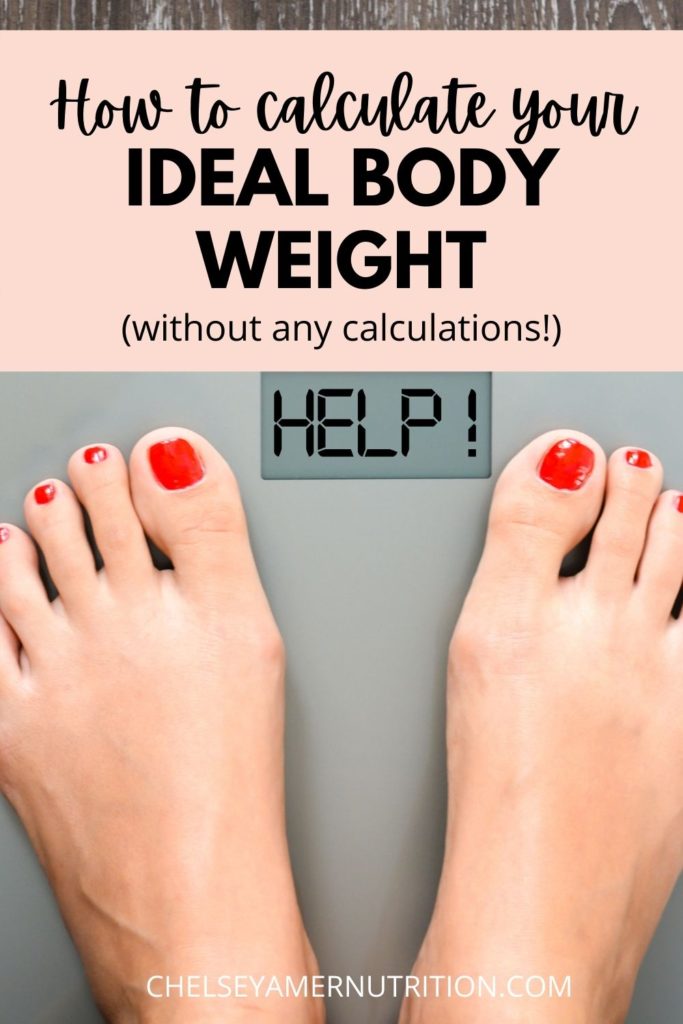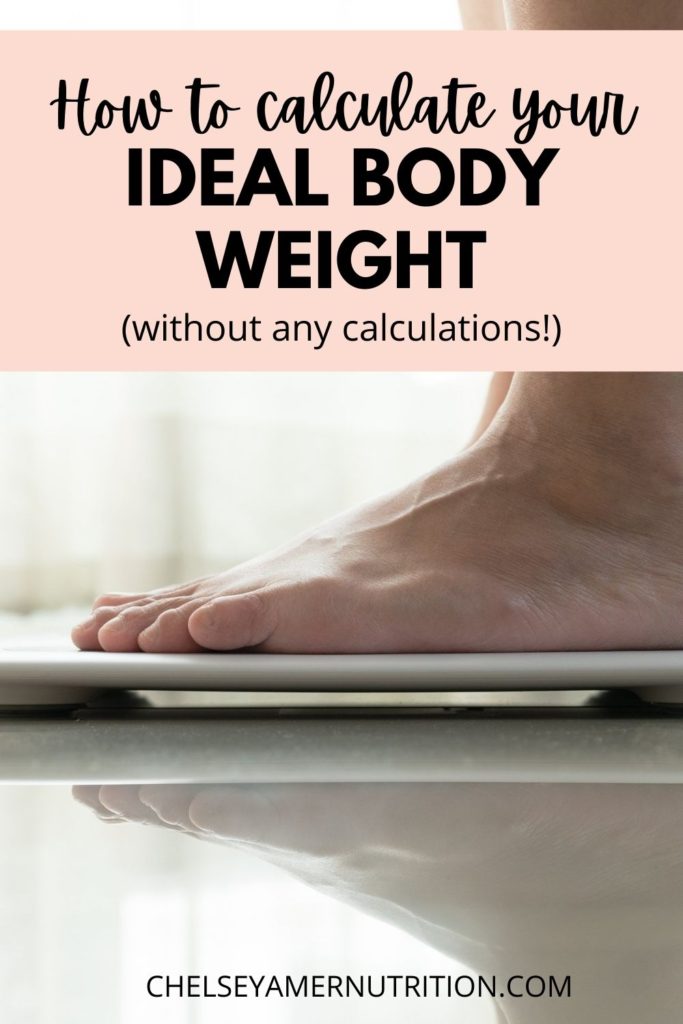How to Calculate Your Ideal Body Weight
Trying to calculate your ideal body weight? Instead of leaning on an outdated calculation, try asking yourself these 5 questions to better understand your body’s ideal body weight and how to reach it.

As I study for my certification to become a Certified Intuitive Eating Counselor I’ve been reflecting a lot on what I learned in grad school. Over 8 years ago I started my journey to become a registered dietitian and the landscape of the profession looked very different then. Or perhaps I was a naive grad student and have just learned so much over the past 8 years.
I was taught and trained from a weight-centric model. Or more specifically that in most instances, ‘weight loss = best’ model. That weight loss cures all disease. But that’s just not accurate according to the scientific literature. If weight loss were to cure all disease then thin people wouldn’t have heart disease (they do). All patients complaining of joint pain in an orthopedists’ office would be in larger bodies (they’re not).
As I’ve worked with and spoken to hundreds of women with a history of disordered eating, plus continued to read the latest research, it’s clear that striving for weight loss can do more harm than good.
There are now over 140 studies that prove the effectiveness of Intuitive Eating, an evidence-based model developed by two registered dietitians that focuses on tuning inward instead of relying on external factors to guide your food choices. For instance, there’s no calorie counting, macro counting, etc. Instead, the 10 principles of Intuitive Eating encourage you to tune inward to rely on your body’s hunger and fullness cues, satisfaction, and rejecting the dieting mentality.
On the contrary, during my training to become a registered dietitian, I was in a very clinical program, using Medical Nutrition Therapy (MNT) to help heal disease. While there’s nothing wrong with using weight as ONE factor in evaluating someone’s health (although I’d argue not necessary most of the time), weight was a necessary indicator for medication and accurate tube feed calculations during my training.
One weight-related concept I was taught in training was to use a patient’s Ideal Body Weight.
Ideal Body Weight is a quick calculation to help you determine how far your patient is from the “ideal.” However, who’s to say the the “ideal” is correct?
Just look at BMI as another example of why these “ideal” calculations are flawed…
- BMI was created by scientist Adolphe Quetelet during the 1800s
- Only white men were used as subjects for his research. This lack of diversity does not account of diverse and cultural differences in body shapes and sizes.
- BMI was never intended to be a marker of health
- BMI category cutoffs (i.e. the difference between “normal” and “overweight”) are arbitrary
- Those who are considered “underweight” have the highest risk of death. (Yes, you read that correctly.)
- Almost one-third of people categorized as “overweight” or “obese” are metabolically healthy.
- BMI does not take into account sex, body frame, fat distribution, or muscle mass – factors we know make a difference in terms of HEALTH.
So why do physicians still use BMI as a marker for health?
Many pharmaceutical companies put millions of dollars behind BMI. It takes time for medicine to catch up sometimes, which is the case.
So if you’ve ever received pressure to lower your weight for “health” without a discussion about BEHAVIORS that actually improve your health (**weight is not a behavior**), ask for another opinion!
With National Diet Month approaching, you may be considering starting a new diet come January 1st, which may have you thinking “how much *should* I weigh?”
So you may be tempted to google how to calculate your ideal body weight… but before you rely on a calculation, there are several other factors to consider when trying to determine your ideal body weight.
Here are 5 Questions to Ask Yourself Instead of Trying to Calculate Your Ideal Body Weight
1 . Do you feel energized throughout the day?
Even keeled energy is a good sign that your body is receiving the nourishment that it needs. If you face mid-morning or 3pm energy crashes, or even an after-lunch dip in energy, chances are you fall into one of the following categories:
- You’re not eating enough
- You’re not eating balanced meals
- Your blood sugar is not stable (which can lead to undesirable health effects)
If you’re not eating enough, your weight may be lower than your ideal body weight. But remember that under-nourishment also means low energy. That’s no way to struggle through your days.
If you’re not eating balanced meals, you’re likely cutting out an entire food group, so you may not be eating all of the nutrients that your body requires. This can also lead to erratic energy levels throughout the day.
If your blood sugar is not stable, you’ll swing from highs after eating to low lows, which leads to more cravings and erratic eating. Erratic eating means it’s hard to effortlessly maintain your ideal weight because you may be more subject to binging and then restricting.
2 . Do you have to restrict any foods or food groups to maintain your weight?
Restricting an entire food group can be troublesome for your body for several reasons. For instance, you can…
- Develop nutrient deficiencies
- Increase your likelihood of binging or overeating
- Damage your relationship with food
In working with clients with a history of chronic dieting (AKA jumping from one diet to another), restricting almost always leads to binging. Binging or overeating and feeling out of control around food can make it difficult for you to maintain a feel good weight for your body.
Consistently feeding yourself well-balanced meals – without restriction – is key to maintain your ideal body weight.
If it’s hard for you to know what to eat without restricting a food group and you feel confused about nutrition, I’m here to help you feel confident about what you eat and when!
3 . Does deciding what to eat stress you out for fear of weight gain?
If you’re constantly stressed bout what to eat for fear of weight gain, there’s a chance you’re not at the weight that’s easy for your body to maintain AKA your ideal body weight.
Babies are born in all different shapes and sizes… and that doesn’t change as we age! Even if we were to all eat and drink the same things, move in the same way, and have the same stress levels, our bodies would be different.
Stressing over what to eat is often an indication to me that you have to overly micromanage what you eat. Even if you’re not following a rigid diet plan this is a form of dieting and restriction. And as we know, your ideal body weight is not found through a diet. It’s found through balanced eating, including your favorite foods in your diet.
4 . Do you have certain “food rules” you follow?
“Don’t eat after 7pm!” “Don’t eat before 1pm!” “Only eat 1 starchy carb per day!” “Only eat high fiber carbohydrates!” “Eat only 1 serving of fruit per day!” “Never eat sweetened yogurt.” These are all examples of food rules that I often hear from clients.
When living your life following food rules you’re still limiting yourself. Limiting yourself, like restriction mentioned above, means that you’re micromanaging what you eat… and sometimes too much.
Too much micromanaging is not sustainable. It backfires 10/10 times. By following food rules you’re likely not maintaining your ideal body weight. It takes getting rid of your food rules to find the ideal body weight that’s best for you. And no calculation will show you that!
5 . Can you eat all the foods you genuinely enjoy?
If you’re not able to keep X food in the house (common examples are peanut butter, cookies, chocolate, etc.), do you really have a solid relationship with food or are you trying to avoid your “triggers?” As I wrote in this article about Halloween candy, normalizing your favorite foods by keeping them in the house is key to habituation. Eventually these foods will be off of their high horse and seen as morally equivalent to kale, for instance.
If it seems impossible for you to keep Oreos in the house for fear of binging on the entire box, I want you to know that I was once there. And when I had any sweets in the house I felt out of control. And my weight was always fluctuating. Now, we have a pantry full of snacks that sometimes go untouched for days and weeks. That’s what’s possible when you learn to trust yourself and improve your relationship with food.
Your ideal body weight should be a weight at which you can eat all foods your genuinely enjoy on a regular basis. Not just zucchini noodles or spaghetti squash instead of pasta. Not just cauliflower rice instead of real rice.

Remember you don’t need an equation to calculate your ideal body weight. You don’t have to stress over what to eat any longer!
You can feel great AND enjoy your favorite holiday foods (and many of my Nutrition Training Program alumni and clients are proof!).
If you’re looking to improve your relationship with food and find your body’s natural ideal weight, join the Nutrition Training Program. This self-paced course was created with you in mind so you don’t have to stress over what to eat anymore. You can finally know what helps you feel your best and help you effortlessly maintain your ideal weight.
Plus, I’ll be with you every step of the way! Can’t wait to see you inside! There will be some BONUS TRAININGS in January too!!
XO


 Hi there!
Thanks for stopping by! I'm Chelsey, an online Registered Dietitian, recipe developer, budding photographer, and coffee addict! My mission is to help you feel good through food by answering the question "What should I eat?" Let's make nutrition approachable!
I hope you enjoy my personal collection of simple, healthy, food allergy friendly and nutritiously delicious recipes, plus tips and tons of tricks that will help YOU live a nutritionally-balanced life! I look forward to getting to know you better...
Hi there!
Thanks for stopping by! I'm Chelsey, an online Registered Dietitian, recipe developer, budding photographer, and coffee addict! My mission is to help you feel good through food by answering the question "What should I eat?" Let's make nutrition approachable!
I hope you enjoy my personal collection of simple, healthy, food allergy friendly and nutritiously delicious recipes, plus tips and tons of tricks that will help YOU live a nutritionally-balanced life! I look forward to getting to know you better...







